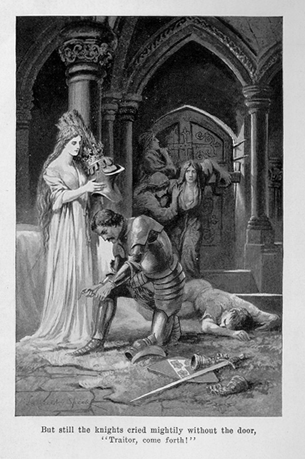 Malory's Le Morte D'Arthur is possibly one of the most well known works of Arthurian Lit. It was the work that my Arthurian Lit class chose to end the semester with. (My final is on Saturday - wish me luck!) And here is my final essay for the course on the dissolution of the fellowship of the Round Table. Page numbers are from the Winchester Manuscript published by Oxford World Classics.
Malory's Le Morte D'Arthur is possibly one of the most well known works of Arthurian Lit. It was the work that my Arthurian Lit class chose to end the semester with. (My final is on Saturday - wish me luck!) And here is my final essay for the course on the dissolution of the fellowship of the Round Table. Page numbers are from the Winchester Manuscript published by Oxford World Classics._____________________________________________
From the moment that the Knights of the Round Table set
out on the quest for the Sangreal, King Arthur knew that the dissolution of the
order was at hand. “I am sure,” he says, “At this quest of the Sangrail shall
all ye of the Table round depart, and never shall I see you again whole
together” (p. 316). This is really the beginning of the end, and from this
point there are numerous causes that can be seen that bring about the end of
the fellowship.
The quest for the
Holy Grail becomes the epitome of all the adventures that the Knights have had
so far. The recluse’s chastisement and warning to Lancelot is a foreshadowing
of problems to come – “Now have I warned thee of thy vainglory and of thy
pride, that thou hast many times erred against thy Maker. Beware of everlasting
pain…” (p. 350). Lancelot’s faults are emphasized when he is not permitted to
see the Sangreal. Futhermore, when Galahad heals the Maimed King, he fulfills
the prophesy from the time of Joseph of Arimathea. Once that has been
completed, the Knights of the Round Table have not much left to aspire to or to
fight for. Without a unifying purpose, it is only a question of time before the
fellowship falls apart.
The downfall is jointly caused by Lancelot’s and Guinevere’s affair, and Mordred’s revelation of that affair. Mordred, a recreant knight, only does this this because of his own selfish motives, and desire to obtain the throne. Ironically, despite his malevolent motivations, he is still exposing sin and what could potentially be considered Lancelot’s treason. Lancelot, on the other hand, is conflicted in his struggle to remain true to the laws of chivalry and courtly love. Chivalry demands that he remain loyal to his king, but courtly love insists that he protect and defend his lady – who just happens to be the king’s wife.
The downfall is jointly caused by Lancelot’s and Guinevere’s affair, and Mordred’s revelation of that affair. Mordred, a recreant knight, only does this this because of his own selfish motives, and desire to obtain the throne. Ironically, despite his malevolent motivations, he is still exposing sin and what could potentially be considered Lancelot’s treason. Lancelot, on the other hand, is conflicted in his struggle to remain true to the laws of chivalry and courtly love. Chivalry demands that he remain loyal to his king, but courtly love insists that he protect and defend his lady – who just happens to be the king’s wife.
 |
| Lancelot prepares to fight his King for his Lady. |
Gawain, though not originally
involved, becomes a major player in the downfall of the fellowship. When he
first hears of Mordred’s and Agravain’s plan, he foresees that “the noble
fellowship of the Round Table shall be disparbled” (p. 469). He persists in
supporting Lancelot and the queen, until Lancelot accidentally kills Gareth,
Gawain’s brother. Then, his wrath is so great that he convinces King Arthur to
launch into full-out battle against Lancelot. Arthur, like Lancelot, is torn
between his love for Lancelot and for Gawain.
Another, less
physical cause of the downfall of the fellowship of the Round Table is Fortune.
Arthur has a dream about the Wheel of Fortune, where he, attached to the wheel,
rises up to the top, and then is spun back down into the “hideous black water”
of bad fortune (p. 510). By bad luck, a serpent stings a soldier who
unthinkingly pulls out a sword to kill it, breaking the peace between Arthur
and Mordred. And Lancelot laments what everyone is thinking when he says,
“Alas, who may trust this world?” (p. 521).
There are numerous
causes that brought about the dissolution of the Knights of the Round Table,
and all are equally to blame – Lancelot’s affair with Guinevere, Mordred’s
involvement, Gawain’s blind wrath, and the maneuverings of Lady Fortune and her
Wheel. There is also fault within the systems of chivalry and courtly love,
which caused Lancelot’s turmoil and played a part in the fellowship’s downfall.
Malory illustrates that the ultimate failings were these systems, as well as
the lack of honor at the core of mankind – shown in Mordred and in the nobles
who followed him because they were so tired of war. Was there any one thing
that could have been done to prevent the dissolution? I don’t think so. Too
many different forces contributed in too many ways that the fall of Arthur and
his knights was inevitable.
~Sophia
 |
| The death of Arthur and Mordred |

No comments:
Post a Comment
Book discussions make the world a better place! Write me a comment - I respond to each and every one, I promise. So check back!
(YES! I LOVE TAGS and I do them! So tag away! But no bloggerly awards, though, like the Liebster or the Sisterhood of World Bloggers. Thank you!)